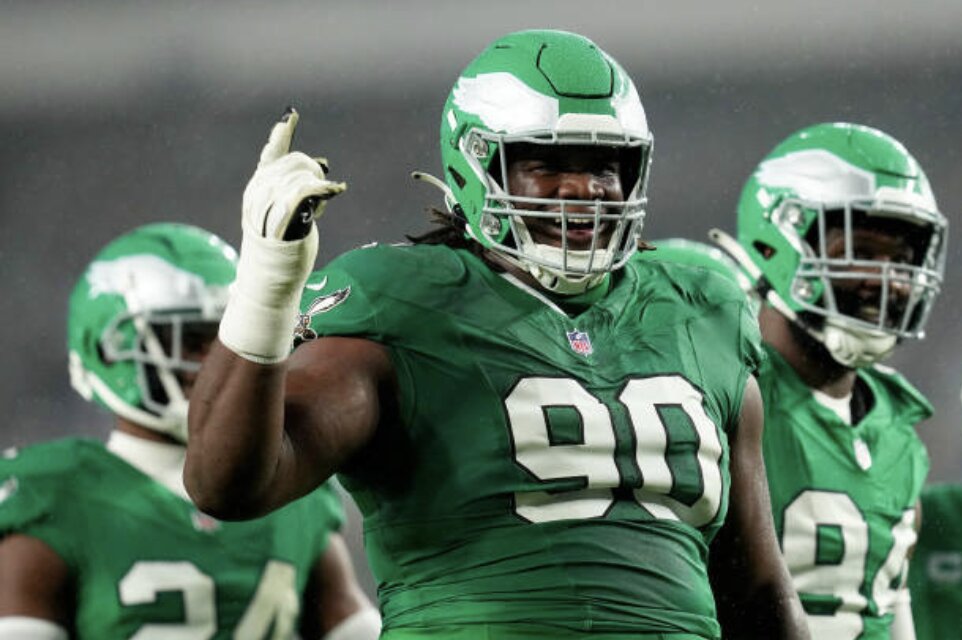Running Back Silence Speaks Volumes About Sanders, Committee Approach
It’s often said that actions speak louder than words. Inaction can have an equally powerful and commanding voice.
For the Philadelphia Eagles, their dormancy in enhancing the running back position through free-agent spending or the draft this year is perhaps the organization’s loudest and most clearest commentary on its belief in Miles Sanders and its most honest admission about the running back committee that team brass and Doug Pederson have surrendered to for the past four seasons.
For years, Pederson has painted a rosy picture of the team’s RBBC approach, citing benefits of diverse ball carries who bring disparate skills and can be mixed-and-match to specific schemes. Who could argue? In 2017, the trio of LeGarrette Blount, Jay Ajayi and Corey Clement powered the league’s third-ranked rushing offense and helped the Eagles win their first Super Bowl.
But Pederson and the Eagles soon recognized the complexities in building a ground game ruled by the many, and the perils of thinking history repeats.

ITB Photo: Second-year running back Miles Sanders showed as a rookie all the tools necessary to become a multi-dimensional weapon.
(ITB Photo: Second-year running back Miles Sanders showed as a rookie all the tools necessary to become a multi-dimensional weapon.)
Ajayi came to the Eagles with a history of knee issues and didn’t stay healthy. Neither did Clement nor did last year’s big trade acquisition, Jordan Howard. Still, the team’s prolonged carousel approach, and Pederson’s obligatory golly-gee endorsement of it, blurred the perspective of fans — and even some respected members of the media — into thinking Pederson actually favored a stable of good-to-average performers over a dynamic, multi-dimensional, three-down weapon.
The reality is that Pederson was simply playing the hand that Howie Roseman dealt him, and he and position coach Duce Staley did an excellent job finding ways to put the puzzle pieces together despite the lack of a blue-chip talent.
One look at Pederson’s coaching mentor, Andy Reid, is all you need to know about what Pederson would prefer for his offense. Reid frequently sought to have a multidimensional halfback who possessed the multitude of run-and-catch skills to handle 18-to-20 touches per game and create mismatches without having to constantly sub personnel.
From Staley to Brian Westbrook to LeSean McCoy in Philadelphia and then in Kansas City from Jamaal Charles to Kareem Hunt, Reid has built his offenses around running backs with speed, quickness, reliable hands and aptitude for blitz pick-up.
You think Pederson observed Reid’s 20-year success with these running backs and concluded that RBBC was more optimal than an ultimate weapon?
Reid managed to break his Super Bowl hi-jinx last year without Hunt, who was booted off the team in 2018 for an off-field incident, but immediately used his first-round pick on LSU’s multidimensional halfback, Clyde Edwards-Helaire.
This year, Eagles fans will witness Pederson’s true intentions, a ground game predicated less on communal carries and more on molding Sanders into following in the footsteps of the aforementioned greats.
Sanders has all the traits to emerge into every bit of a prolific weapon that his position coach was during Reid’s early years coaching the Eagles. Sanders, who totaled 1,327 offensive yards as a rookie, should see a major increase in workload, especially without Howard or another established veteran looking over his shoulder.
Despite having ample cap space in 2020, the Eagles turned their nose at signing Todd Gurley, Carlos Hyde, Matt Brieda, DeAndre Washington, Peyton Barber and several other cost-efficient running backs to short-terms deals that would’ve barely dented their cap space.
That they didn’t even spend a measly $750,000 in guaranteed money for Hyde, and even less for Barber, best illustrates their belief Sanders will be the featured piece of the team’s ground game.
So why even flirt with Devonta Freeman?
It’s June, and Freeman remains unsigned. If he comes back to Earth with his financial demands, the former Falcon could be a steal for any team that would decide to sign him.
In measured snaps, Freeman could showcase the talent that once made him among the league’s top running backs and also give himself a better opportunity to avoid the rampant injuries that have since dogged him.
If the Eagles signed Freeman they’d be ridiculous to let him collect dust on the bench, but make no mistake, Freeman would still play second fiddle to Sanders. Signing the two-time Pro Bowler wouldn’t be an indication of another committee blueprint, just an opportunity to improve depth and talent at a position constantly thinned by injuries.
The Eagles are poised to enter 2020 without an established veteran who could step into the primary role if Sanders were to miss time, which again paints their picture of commitment to Sanders and their belief that one Boston Scott, Elijah Holifield, Corey Clement or the rookie free agents could take on an expanded role if necessary during the season.
At very least, the Eagles have all of training camp to make that decision and scour the waiver wire after teams make final cuts.
If the Eagles really believed their past success was fueled by the committee approach, they’d have done much more this offseason to bolster the position.
– Geoff Mosher (@geoffmoshernfl) is a longtime Philadelphia Eagles and NFL reporter and co-host of Inside the Birds.
Listen to the latest Inside the Birds podcast right here:






Comments are closed here.